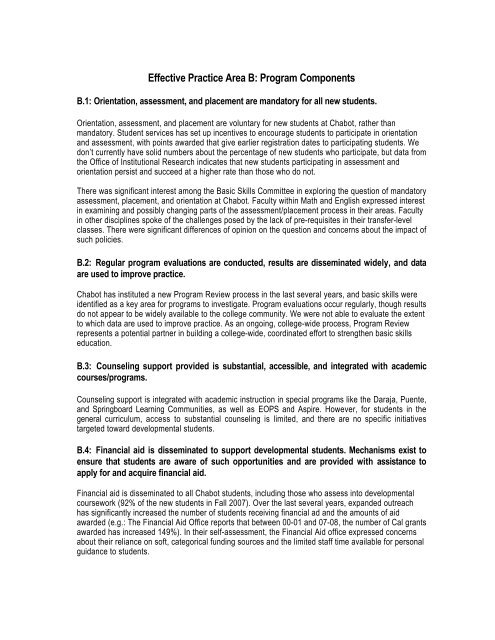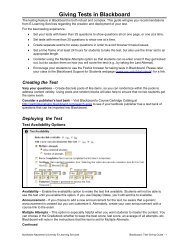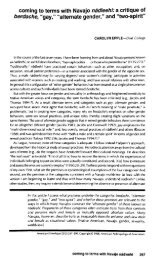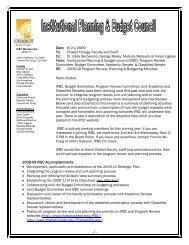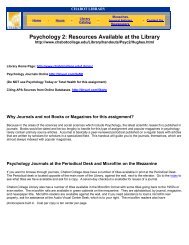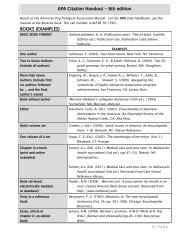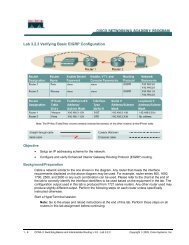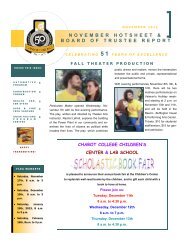BSI Self-Assessment Summary.rtf - Chabot College
BSI Self-Assessment Summary.rtf - Chabot College
BSI Self-Assessment Summary.rtf - Chabot College
Create successful ePaper yourself
Turn your PDF publications into a flip-book with our unique Google optimized e-Paper software.
Effective Practice Area B: Program Components<br />
B.1: Orientation, assessment, and placement are mandatory for all new students.<br />
Orientation, assessment, and placement are voluntary for new students at <strong>Chabot</strong>, rather than<br />
mandatory. Student services has set up incentives to encourage students to participate in orientation<br />
and assessment, with points awarded that give earlier registration dates to participating students. We<br />
don’t currently have solid numbers about the percentage of new students who participate, but data from<br />
the Office of Institutional Research indicates that new students participating in assessment and<br />
orientation persist and succeed at a higher rate than those who do not.<br />
There was significant interest among the Basic Skills Committee in exploring the question of mandatory<br />
assessment, placement, and orientation at <strong>Chabot</strong>. Faculty within Math and English expressed interest<br />
in examining and possibly changing parts of the assessment/placement process in their areas. Faculty<br />
in other disciplines spoke of the challenges posed by the lack of pre-requisites in their transfer-level<br />
classes. There were significant differences of opinion on the question and concerns about the impact of<br />
such policies.<br />
B.2: Regular program evaluations are conducted, results are disseminated widely, and data<br />
are used to improve practice.<br />
<strong>Chabot</strong> has instituted a new Program Review process in the last several years, and basic skills were<br />
identified as a key area for programs to investigate. Program evaluations occur regularly, though results<br />
do not appear to be widely available to the college community. We were not able to evaluate the extent<br />
to which data are used to improve practice. As an ongoing, college-wide process, Program Review<br />
represents a potential partner in building a college-wide, coordinated effort to strengthen basic skills<br />
education.<br />
B.3: Counseling support provided is substantial, accessible, and integrated with academic<br />
courses/programs.<br />
Counseling support is integrated with academic instruction in special programs like the Daraja, Puente,<br />
and Springboard Learning Communities, as well as EOPS and Aspire. However, for students in the<br />
general curriculum, access to substantial counseling is limited, and there are no specific initiatives<br />
targeted toward developmental students.<br />
B.4: Financial aid is disseminated to support developmental students. Mechanisms exist to<br />
ensure that students are aware of such opportunities and are provided with assistance to<br />
apply for and acquire financial aid.<br />
Financial aid is disseminated to all <strong>Chabot</strong> students, including those who assess into developmental<br />
coursework (92% of the new students in Fall 2007). Over the last several years, expanded outreach<br />
has significantly increased the number of students receiving financial ad and the amounts of aid<br />
awarded (e.g.: The Financial Aid Office reports that between 00-01 and 07-08, the number of Cal grants<br />
awarded has increased 149%). In their self-assessment, the Financial Aid office expressed concerns<br />
about their reliance on soft, categorical funding sources and the limited staff time available for personal<br />
guidance to students.


